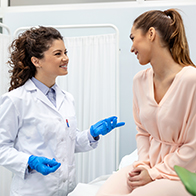Why the Blockbuster Hit 'Barbie' Matters to Women of All Ages

Editor's note: Spoiler alert. If you haven't seen the movie "Barbie," please bookmark this page for later enjoyment.
Women of all ages aren't being proactive about their reproductive sexual health.
Unlike Hollywood's summer hit "Barbie," their lack of gynecologic care isn't because they're genitalia-less plastic dolls looking to escape Barbieland. No, it's often the result of real-life barriers to accessing America's health care system.
How many women in the United States are uninsured?
Approximately 10.3 million American women between the ages of 19 to 64 are uninsured, according to a 2022 report.
Whether it's due to a lack of health insurance, a costly barrier or a general misunderstanding of the importance of regular visits to the gynecologist, many American women are missing out on vital, possibly life-saving, reproductive health care.
Why did Barbie end with a visit to a gynecologist?
The topic of women's reproductive health has been back in the spotlight with the release of the highly anticipated summer blockbuster hit "Barbie." The movie about the iconic Mattel doll-turned-human ended with a twist. Barbie visited a gynecologist for the first time.
"I'm here to see my gynecologist" are the simple last words spoken by Barbie, played by Margot Robbie.
In response to media interest in the film's final line, Barbie director Greta Gerwig explained why she chose a gynecologist's office as the setting for the final scene. In an interview with USA Today, Gerwig said her childhood influenced Barbie's last words.
"With this film, it was important for me that everything operated on at least two levels," Gerwig told USA Today. "I knew I wanted to end on a mic drop kind of joke, but I also find it very emotional. When I was a teenage girl, I remember growing up and being embarrassed about my body, and just feeling ashamed in a way that I couldn't even describe. It felt like everything had to be hidden."
"And then to see Margot as Barbie, with this big old smile on her face, saying what she says at the end with such happiness and joy," Gerwig said. "I was like—if I can give girls that feeling of, 'Barbie does it, too'—that's both funny and emotional. There are so many things like that throughout the movie. It was always about looking for the levity and the heart."
Who cares how Barbie ended?
Why does it matter, you might ask?
- In comparison to peers living in the top 10 high-income nations, American women are more likely to skip or delay necessary health care because of cost, according to a 2022 study.
- Only 40 percent of American women visited a gynecologist or obstetrician once a year, as recommended, according to a 2018 report.
- The number of women aged 15-44 who had a pelvic exam declined from 1988-2015, a 2019 report from the Centers for Disease Control and Prevention (CDC) shared.
Best-selling author Anna Cabeca, D.O., OB-GYN, of Dallas, host of The Girlfriend Doctor podcast, took her youngest daughter to see the movie and weighed in on why Barbie's gyno visit matters in an interview with Giddy.
"What was the first thing she did when she became a human woman? Well, go to her OBGYN," Cabeca said. "I think that was a powerful and important message to send out—one that says I am in charge of my own health and sexuality. It was also a great reminder to all women out there … if you haven't seen your gynecologist in a while, it's time to go."
What is reproductive and sexual health?
Sexual and reproductive health is as vital to a woman's overall physical health as her heart health.
"Reproductive health implies that people are able to have a satisfying and safe sex life and that they have the capability to reproduce and the freedom to decide if, when and how often to do so," according to the World Health Organization.
Reproductive health encompasses anything (physically or mentally) affecting a woman's reproductive organs. From family planning to irregular periods, a woman's gynecologist is the professional best suited to treat a wide range of reproductive health care needs in people with female organs.
When asked if women's reproductive health seems to be a priority in America, Cabeca said, in her opinion, it's simply not—but it should be.
"I think that men's health is a priority in America in general; we are still very much in a male-dominated society across the board, in business and in pharmaceutical companies, and it's prevalent in most commercials as well," she said. "Women's health and preventive health are absolutely not a priority, and as a gynecologist, understanding that many times preventive care, holistic care and integrative care are not even covered by insurance can be extremely frustrating."
Sexual and reproductive health education in the U.S. has a lot of room for improvement, she said. Some women, and men, don't have an even basic understanding of the anatomy of the vagina when they first become sexually active.
"The education and the ability to fully understand our reproductive health and organs, the education around our menstrual cycles and the timing of the menstrual cycles and what is normal and how to have healthier menses and healthier periods and safe, reliable ways to protect ourselves from STDs and pregnancy, is just not in the forefront of our educational program or social conversations," she said.
Why are women, other than Barbie, neglecting their reproductive health care, and what can we do about it?
From Covid 19 to the day-to-day chaos of life, there's a plethora of reasons why a woman's reproductive health may be the last thing on her mind.
Women are often the (unpaid) health-care case managers for their family members, be it children or a partner, sometimes leaving their own health to take a backseat to the needs of others. Worldwide, 70 to 80 percent of impaired elderly people are cared for at home by family members—between 57 to 81 percent of whom are women, according to a 2016 review.
Female caregivers often have their own families, work and lives to juggle on top of caregiving responsibilities.
Sometimes, simple geography can get in the way of reproductive health care. Depending on where women live, their ability to see a gynecologist may be limited.
More than 6.9 million American women live in areas where maternity care is unattainable, a 2022 report from the nonprofit March of Dimes estimated. More than a third of U.S. counties are classified as maternity care deserts, according to the same report.
Does reproductive health care matter more for some ages than others?
Reproductive health care matters at all ages of a woman's life. From a young girl's first period to menopause in later life, women need reproductive health care to live their healthiest life.
As a reminder to older women, Cabeca said it is crucial for women to stay vigilant with their gynecology exams in later life.
"I think it is important that while we're focusing on young women's reproductive age, we also need to acknowledge the guidelines for women after the age of 65," she said. "For instance, the sense that once you've reached a certain age, women don't need a pap smear. I have to tell you that she absolutely does."
The OB-GYN emphasized that sexually active, or formerly sexually active, women still need to visit their gynecologists regularly. Just because a woman hasn't gotten frisky in a while doesn't mean she should skip her annual visit to the gyno.
"Remember that the [human papillomavirus] HPV virus can emerge at any time and mutate into cancerous cells without any symptoms for a while, and the only way to detect that is during a pap smear—and THAT has nothing to do with reproduction, it's part of being a sexually active woman," Cabeca said.
What is the age a woman should first visit a gynecologist?
Teenage girls should have their first gynecological appointment between the ages of 13 to 15, the American College of Obstetricians and Gynecologists (ACOG) shared.
Women should see a gynecologist for the first time by age 21 or as soon as they are sexually active, whichever comes first, Cabeca said.
When should a girl have her first pelvic exam?
The answer to that question depends on whether a young woman is sexually active or not.
"Assuming it's a young girl, not sexually active, she wouldn't have to have a pelvic exam or Pap smear until after her first sexual activity, but we can still conduct a well-woman exam, find out if there are any issues, concerns, see them (in) the office first fully clothed, have a conversation, get to know each other, develop that doctor-patient trusting relationship," she said.
It's a good way to establish trust and could help encourage a young girl to ask questions about her health from a trustworthy source.
"Later on, we can follow up in the exam room with a nurse present or someone that is her support person to do an initial well-woman exam, which includes a head-to-toe breast exam, pelvic exam etc.," Cabeca said.
When should you get your first pap smear?
A Pap test can detect abnormal cells in a woman's cervix that can lead to cancer, before they become deadly. This is why ACOG advises women to make a gynecology appointment for their first Pap smear by age 21, even if they are not yet sexually active.
A Pap test can detect dangerous cells in a way that an external genital exam or a physical exam cannot.
How often do women need to visit a gynecologist?
The recommended frequency of gynecology exams really depends on the individual woman and whether she has a history of reproductive health problems.
"When a woman is healthy and has no medical condition that requires monitoring, then I recommend a check-up once a year," Cabeca said.
It's a good place to start.
"If she is on some sort of hormonal management, then maybe every six months just to check the levels and see if the method chosen still works for her, but a yearly check-up is really all that is required."
The OB-GYN reiterated that older women should not forgo their reproductive health care in later years just because they might not be as sexually active as they once were.
"Women (and men) remain sexually active throughout their lifetime, and way past menopause, so YES—old people do have sex," Cabeca said.
Sexual activity or not, it's important to get checked for several reasons.
"Because of that, the yearly pelvic exam and Pap smear remain essential so we can screen for STDs, HPV, uterine cancer, breast cancer etc…those medical threats do not dissipate with age; actually, they are often overlooked, as we assume that once you get older, your sexuality dies, which is simply not true."
Can adults go to Planned Parenthood?
Adults, women and men can visit one of Planned Parenthood's 600 locations nationwide for reproductive or sexual health care.
In addition to its well-known abortion care, Planned Parenthood clinics can provide birth control, emergency contraception, HIV services, transgender hormone therapy, men's health services, patient education, pregnancy and sexually transmitted infections (STI) testing.
They also offer routine women's health care services, including the HPV vaccine, according to its website.
Can you go to the gyno on your period?
Short answer: yes. There's rarely a time when menstruation should keep a woman from visiting her gynecologist, according to Cleveland Clinic.
The only exceptions to that rule are if a woman is bleeding heavily, soaking a pad or tampon every hour, or if she is passing clots. If that's the case, then reach out to your doctor's office, explain the situation and see if they'd prefer that you reschedule your appointment.
Can a doctor tell if you are sexually active?
Teen girls can rest easy knowing their gynecologist's pelvic exam will not be able to tell whether they are sexually active or not. Contrary to public belief, a hymen is not a clear-cut sign of a woman's virginity or lack thereof.
The hymen is tissue that varies in size and shape, depending on the woman, and covers all or part of the vaginal opening. The hymen can be broken in a number of different ways that do not include penetrative sexual intercourse.
Still, it is important for women, young and old, to be open and honest with their gynecologists about their sexual histories.
What kinds of things can you ask a gynecologist?
Anything and everything. A gynecologist's office should be a safe space for women to share their reproductive health concerns without shame.
Bring a list of all prescriptions and medications you may be taking, as well as a brief history of your menstrual cycle, to your first appointment with a new gynecologist, Cabeca said.
"Because oftentimes you get in that exam room and you forget what you really are concerned about, I recommend making a list ahead of time," she said.
"If you're nervous, bring a friend, your mom or your husband, anyone that can hold your hand," Cabeca said. "It can be intimidating when you meet this physician, and the first thing they do is 'check you down there.'"
What kinds of symptoms should alert women to see their gynecologist?
If women experience the following changes, Cabeca said it's time to call the OB-GYN.
Reasons to see a gynecologist include:
- Menstrual changes, such as irregular periods
- Breast soreness
- Smelly vaginal discharge
- Itchy vulva
- Pain during intercourse
- Lower pelvic pain
- Breast lump
"I always say, if you have any concerns, any issues, make an appointment with your gynecologist: it's always better to be safe than sorry," she said.
The bottom line
The state of women's health is often an indicator of a nation's overall public health. The reproductive health of people with female organs matters—and "Barbie" helped highlight that fact.
No matter their age, women should be mindful of their sexual health. Remember, if something seems off down there, it's time to make an appointment to see your gynecologist.




















